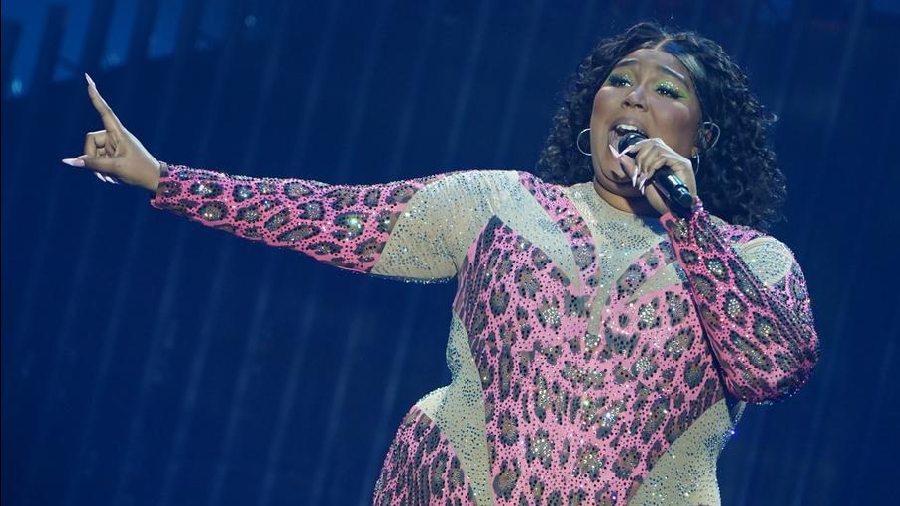If there was a ranking for singers preaching self-love, Lizzo would certainly be at the top. The 34-year-old unabashedly wears skin-tight glitter onesies, and celebrates her curvy figure on stage during her performances and in the media. Her message is simple: Love yourself — you're great just the way you are. With her anthems of self-empowerment, Lizzo is one of the most interesting — and sought-after — people in the music world today. On March 16 she will wrap up her European tour with a final gig in London.
Packaged with catchy beats and heartfelt lyrics, Lizzo has captivated listeners around the world in recent years. Her songs regularly go viral on TikTok and she wins awards left and right — she recently won her fourth Grammy. Lizzo is currently busy touring Europe with her mix of pop, rap and R&B tunes. She recently gave three concerts in Germany, which even included a techno-inspired performance of Rammstein's song "Du Hast." After a twerk dance routine, she made her message of love clear, telling the audience "I love you!" in German.
With her appeal for more self-love, Lizzo is an icon in an era in which beauty norms are being questioned and people of color and other marginalized groups are increasingly being represented in movies, TV and in the music world. Fans celebrate Lizzo for her confidence as a Black woman. "I love you, don't forget it, you beautiful black masterpiece!" she says in her song "Skin."
In an October 2022 interview in Vanity Fair magazine Lizzo said: "I'm a Black woman, I make music from my own Black experience. If I can help other people with that, then that's good. Because we're the most marginalized and neglected group in this country. We need self-love and self-love anthems more than anyone.”
Becoming a body positivity icon
Lizzo was born Melissa Viviane Jefferson in April 1988 and grew up in Detroit, Michigan and Houston, Texas. She studied classical flute performance at university in Texas before moving to Minneapolis, where she got involved in the rap and hip-hop scenearound 2011. She released her first album, "Lizzobangers," in 2013.
As a child, Lizzo was bullied because of her figure, and found solace in music. Today, Lizzo campaigns against body shaming, for many she is an icon of thebody positivity movement. While Lizzo has become a messenger for loving your own body, she was not always comfortable in hers, and her personal journey from shaming her body to embracing it began not with a glamorous photo shoot but with a traumatic accident.
In an interview with US public radio broadcaster NPR, Lizzo said she had been swinging on a rope into a river when the rope suddenly broke and she flew to the ground, severely scraping herself up. While she was healing, she realized then that her skin was her favorite thing about herself.
"It was in that moment where I realized I damaged my skin where I saw the value in it. And that was the first time I'd ever discovered my body love," she said. The revelation inspired her song "My Skin" about learning to love one's own body as it is.
Body positivity 'commercialized'
She describes herself as fat and says she wants to normalize and destigmatize larger bodies. Yet, in an interview with People magazine in 2022, she said she's gotten tired of people constantly talking about her body size. "I know I'm fat. It doesn't bother me. I like being fat, and I'm beautiful and I'm healthy. So can we move on?"
Yet Lizzo has consistently been a spokesperson or body positivity, and her influence hasn't diminished with her rising fame. In an interview with Vogue, she said the body positivity movement had become "commercialized" and "appropriated" in recent years and used mainly by slim, white women. As a result, those for whom the movement was actually intended no longer benefit from it, according to her.
Changing the narrative via various channels
Lizzo aims to change the narrative with projects like her reality TV show "Lizzo's Watch Out for the Big Grrrls." In the series, which won an Emmy in 2022, she searches for backup dancers. Lizzo's performances are notorious for placing Black, trans or curvy dancers on stage alongside her.
The artist also has her own shapewear collection designed for all body types called "Yitty" which she released in 2022. It offers plus sizes up to 6XL. Contrary to what the term shapewear might suggest, customers should not be forced into a questionable ideal of beauty. "I got tired of seeing this sad, restrictive shapewear that literally nobody wanted to wear," Lizzo wrote in a press release. "I decided to take on the challenge of enabling women to feel uncompromisingly good again."
Critical voices could see it as the commercialization of body positivity that Lizzo herself denounces. But for the singer, the collection is another important step in her quest to celebrate all body shapes.










